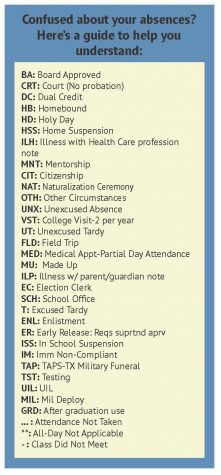At the beginning of my sophomore year I fractured my jaw and suffered a severe concussion, as a result, I was in-and-out of school for more than six weeks, dealing with the unfortunate complications of brain injury. It took months for me to fully recover, but during this time I was determined to catch up on my schoolwork and make up for the weeks I missed. Around this time, AISD implemented, and McCallum started enforcing a new attendance policy. Little did I know it would soon have a drastic effect on me.
In the days after my injury, I attended school, but only for half-days after my doctor released me to do so, and with weekly visits to my doctor and concussion clinic, I was slowly getting back on track. I was determined to finish all my make-up work, without having to go to Saturday school, or fill out any tutoring logs. To organize my make up work, I had a folder for each class and printed out what I was missing, so everytime I finished something, I would check it off the list. I also talked to my teachers about everything that was happening, and kept them updated about my health, and any work that I finished. With a lot of hard work and effort to stay organized I was able to catch up with my school work on my own time.
One day on the morning announcements, an AP was discussing how to calculate how many hours you needed to make up in order to have credit for your classes. If you had more than four hours the AP said you should attend Saturday school or complete tutoring hours to clear your NC (No Credit). I decided to add up my absences, and was soon devastated with my result. I had a total of 63 hours to make up in order to receive credit for my classes. Because I did not have documentation for every single day I missed, the hours added up. A lot of my recovery required me to stay home, and rest, so I didn’t have a doctor’s note for those days, which were the absences that seemed to affect me the most in the end.
The State of Texas requires that all high school students must be in attendance for 90 percent of all class days each semester to receive full credit for their classes. The state policy says that when a student’s attendance drops below 90 percent but remains at least 75 percent of the number days the class is offered, the student may earn credit for the class by making up absences as approved by the principal such as Saturday school and tutoring hours.
I talked to my AP as soon as I added up my hours. My AP told me my options, and I was really frustrated to say the least. I didn’t understand why I needed to make up 63 hours of tutoring just because I had a concussion, which, was not my fault. It was __ frustrating because I had already logged countless hours of my own time getting caught up on my work, but my AP was just following AISD policy and couldn’t do anything about it.

I ended up talking to Mr. Garrison about clearing my absences, and though not all were cleared, after we talked, he cleared the ones that I could follow up with documentation. I also decided to reach out to Ms. Jackson, McCallum’s attendance specialist, to better understand the attendance policy, so I could take the necessary measures to make sure this never happened again. I understood that I should never leave school without a pink slip, because even if you were to have documentation for your absence, and didn’t sign out, it couldn’t be cleared.
Something that I also learned this year is every day a student is absent from class, it costs AISD $45 in revenue from the state. In theory, if all students attend 100 percent of their classes in a year, the school district would receive $50-$60 million in additional state funding. Considering that the school loses revenue everytime a student is absent from class, it’s understandable why schools strictly enforce this policy, and urge all students to attend their classes.
I believe this policy does more harm than good. The hours that I had to make up became more about actual time spent at McCallum than actually learning and doing anything productive. Although this is true, it’s doubtful that we will be able to do anything to change this policy, but there are ways to prevent this from happening to you.
There’s no guide to cheating the system, you just have to voice your concerns and seek help for the administration to find out how to resolve your absences. Reach out to your teachers or other administers if you don’t understand this policy, so you can take the necessary measures to have credit for your classes.








Sophia Shampton • Jan 26, 2018 at 11:26 am
I appreciate the awareness for the silly policy that this article raises, but I felt like it gave me false hope. I was waiting for a solution towards the end and was very disappointed when it was revealed that there “is no way to cheat the system”. The author obviously has authority to say that there is not an easy way out with her insane amount of absences, but I felt a bit led on and didn’t really see a clear opinion, it felt more informative.
Kristen T. • Jan 23, 2018 at 12:30 pm
Wow, that’s crazy! The 90% rule was hard for me last year with so many field trips for sports and other McCallum events, but that sounds much more frustrating to deal with than what I had to do. I don’t think the policy will change either, but there really should be exceptions to it.